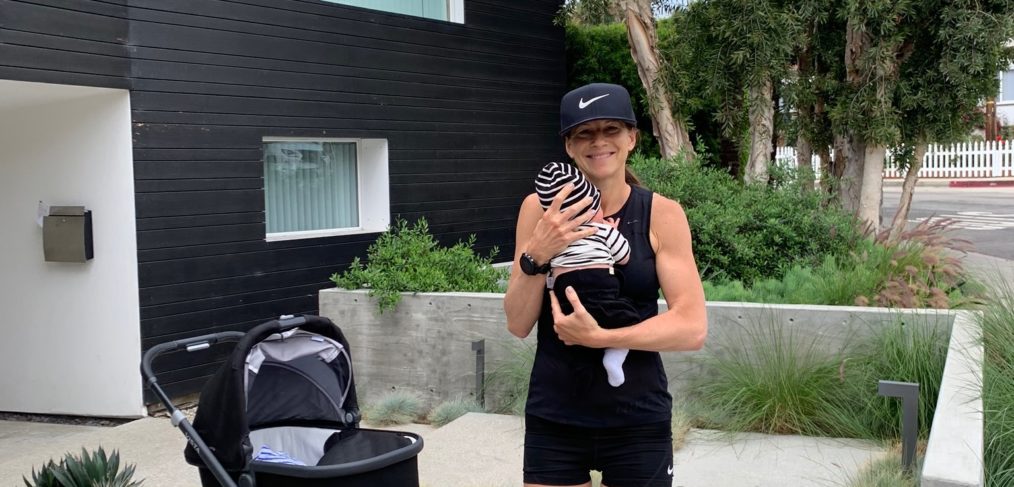Walk It Off, Mama: The Best PostNatal Exercise

The journey I embarked upon nearly one year ago when becoming pregnant still continues. Not just for my own research and learning, but from an observational standpoint of what’s normal, expected and acceptable.
Now well into my fourth trimester, I’m discovering anecdotally just how unusual it is to be nearing the shape of my pre-pregnancy body.
To clarify, I am not at my pre-pregnancy weight, but as a result of staying active during the whole ten months as well as continuing to eat in a nutrient dense, anti inflammatory manner, much of the weight I gained was concentrated in the abdomen.
With the exception of a few pairs of skinny jeans and, towards the ninth and tenth month, jackets, I wore my normal clothing throughout.
And how much weight I actually gained, I do not know.
At the get go, I searched and searched for a definitive answer for this specific data point.
After all, as a woman, and an athlete, what I weigh far from trivial. It’s not the most important thing in the world, but for me, a weekly weigh in with corresponding body fat measurement has been one of several gauges I have used for years to keep on track.
So naturally, as I entered a new realm, I wanted to know roughy what to expect and what would be a healthy weight gain to ensure my baby was growing properly.
Like with many of the other information I searched for, I came up empty with not much useful information than that according to my BMI, I should expect to put on somewhere between 28-40 pounds (1).
For a period of time, I continued my weekly weigh in but once I saw the general trend was right on track, I opted to stop.
Around the same time I made the shift from working with my OB to our midwife, who felt that asking a pregnant woman to step on the scale with each visit was unnecessary, I realized I agreed with her and chose to stop weighing in at home as well.
After our son was born, the last thing I thought about was how much I weighed.
In fact, for the very first time in my life, I wasn’t even concerned with being about to exercise; losing half my blood volume after the birth and being rushed to the hospital made it quite easy to focus on one thing, and one thing only: recovering and healing completely so that I could be home with Yves and learn to be the best mom possible.
First and foremost, the goal was rest… and lots of it.
I couldn’t even walk up the stairs without being extremely short of breath and feeling a sudden, pounding headache (both symptoms of anemia due to blood loss (2).
The silver lining of all of this was that all I wanted to do, and could do, was stay close to Yves 24/7 before even thinking about getting out and about.
Around the middle of the second week, I began feeling like I really wanted to start getting out. Nothing major, just something to move a little; as someone who’d never spent a day in bed in her life, I found I was beginning to get stiff with all the lying down.
Step 1: a gentle, short walk around the block with Chris and Yves. We’re talking 15 minutes at a snail’s pace. I was surprised at how weak I felt and how relieved I was to sit down once we got home.
Not surprisingly, though, the next day I felt just a little better.
I went out that day with the new ‘toy’ – our stroller; this time for half an hour.
I wasn’t yet back to work, coupled with the fact that the new schedule I have isn’t my own, I found the simple act of getting out to walk each day with Yves most rewarding.
I felt better and better and with continued blood building nutrition (and a Moxa treatment from my acupuncturist), I began increasing the distance I’d do each day.
Heart rate remained low and it was 100% walking… not even so much as a thought of running as I’d not yet had my post natal visit with the physical therapist specializing in women’s health / pelvic flood to give me the ok to get more ballistic with activity,
The me of even three years ago would’ve abhorred the idea of ‘just walking’ but much to my pleasant surprise, I found myself loving it.
It is with my son (albeit he sleeps for most of the time), it’s outside, it’s right out the doorstep and it’s any time, given the eating / feeding / sleeping needs of our baby.
In other words, it’s the most natural thing one can do, an in particular, a new mom who’s in the beautiful phase of learning her baby and learning her new, empowered self.
I’ve written and spoken a lot in the past about how walking is highly underrated. I’ve lost count of clients over the years who’ve commented that they don’t have time or interest in doing anything but walking.
As if to say it doesn’t count!
Walking is user friendly, it’s free, it can be done any where, any place and at any time and no equipment is needed (shoes are nice, but not mandatory).
Being a new mom myself now, I get the lack of time, the strange feeling of not owning your own schedule and needing to manage a different sleep schedule.
But here’s the great thing: so many of the issues that are commonly reported to be typical in postpartum are addressed, at least in part, by moving… and eating properly.
Postpartum Depression?
Moms who stay physically active after birth experience fewer depressive symptoms (3).
Difficulty regulating sleep?
Walking every day brings many health benefits. A brisk walk in the afternoon will help you get a better night’s sleep (4). And a little goes a long way; even a collective 30 minutes per day will help. You don’t have to be a marathon runner in order to see weight loss results.
Postpartum weight loss?
Depending on body size, baby size, stroller size and terrain, you will burn roughly 65-100 calories per mile that you walk. It’s also light on the joints so you won’t get as many aches and pains, which you really could do without after having a baby (5).
Overall body healing?
T-cells, B-cells, and natural killer cells are all important parts of your immune system, and walking regularly can increase the numbers and health of these cells. It can also help your body heal quicker due to the fact that it hastens the release of WBCs. Walking can strengthen your defensive capabilities against pathogenic invaders, speed up the healing of wounds, and prevent potentially life-ending diseases. It’s the perfect match to magnify the effects of all that bone broth you’re drinking (6)!
Wanting to do all you can to optimize opportunities for your baby to learn?
What’s better than one:one time with mom, breathing in fresh air and learning from the excellent example she’s setting for making moving a top priority!
If you’ve got health concerns, certainly check with your healthcare provider but now’s the time. Even if you’re regretting not being more fit during pregnancy or how much you’ve put on or how you’ve eaten, it’s never too late to auto correct and make now the time that you get fit, safely and permanently.
Make it fun! For me, being an endurance athlete, I’ve been finding that setting weekly mileage goals and varying the walks feels like a good fit as I’ve so used to training… but I’m doing it with a vastly different desired outcome in mind compared to getting ready for a race!
We’ve built up to 50 miles per week in what we’re (ok, what I!) am calling championship stroller walking.
And the weight? I got on the scale when Yves was about one month old.
While I didn’t really know what to expect, I was relieved to observe my reaction not at what the value was, but that I didn’t feel alarmed.
Nearly 20 pounds higher than my normal weight, I took it at face value and simply marked it down in my mind as starting point “A” and knew exactly what I needed to do: just what I’d been doing all along – eat well and move and trust that my body and mind will lead one another to the weight I’ve been at for years.
No idea how much weight was lost since the final days of pregnancy since I never got that value… and also not bothered by it either.
I’m enjoying every moment of this phase and happy to share as I go along.
How’s your fourth trimester weight loss journey going?
Feeling stuck?
Lace up those shoes and get walking!
https://www.livescience.com/36321-weight-gain-pregnancy-2nd-trimester.html
https://www.merckmanuals.com/home/blood-disorders/anemia/anemia-due-to-excessive-bleeding
http://www.cnn.com/2008/HEALTH/diet.fitness/06/12/healthmag.walking.health/index.html





